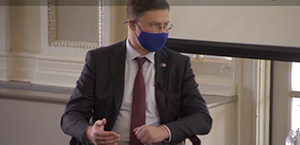ESC has online video offerings for select items from its extensive programming. These resources are meant to ehance transatlantic conversations happening and enrich understandings of Europe here in the United States.
Resources can be used as classroom aids, out-of-classroom assignments, or as background for research papers. Please provide proper citation of any of the resources used (examples below). Please let us know how you are using the videos! Send a message to europeanstudies@pitt.edu with your stories.
You can also watch our collection on the UCIS YouTube Channel.
Citation examples:
-
MLA
European Studies Center. "Title of Video." University of Pittsburgh, Date it was posted, URL.
-
APA
[European Studies Center, University of Pittsburgh]. (Year, Month Day it was posted). Title of the Video [Video file]. Retrieved from URL.
-
Chicago
European Studies Center, University of Pittsburgh. "Title of Video." YouTube video, length. Date published. URL.
 Trade, Technology, and the Transatlantic Relationship
Trade, Technology, and the Transatlantic Relationship
A conversation with European Commission Executive Vice Preseidnet Valdis Dombrovskis
September 30, 2021

